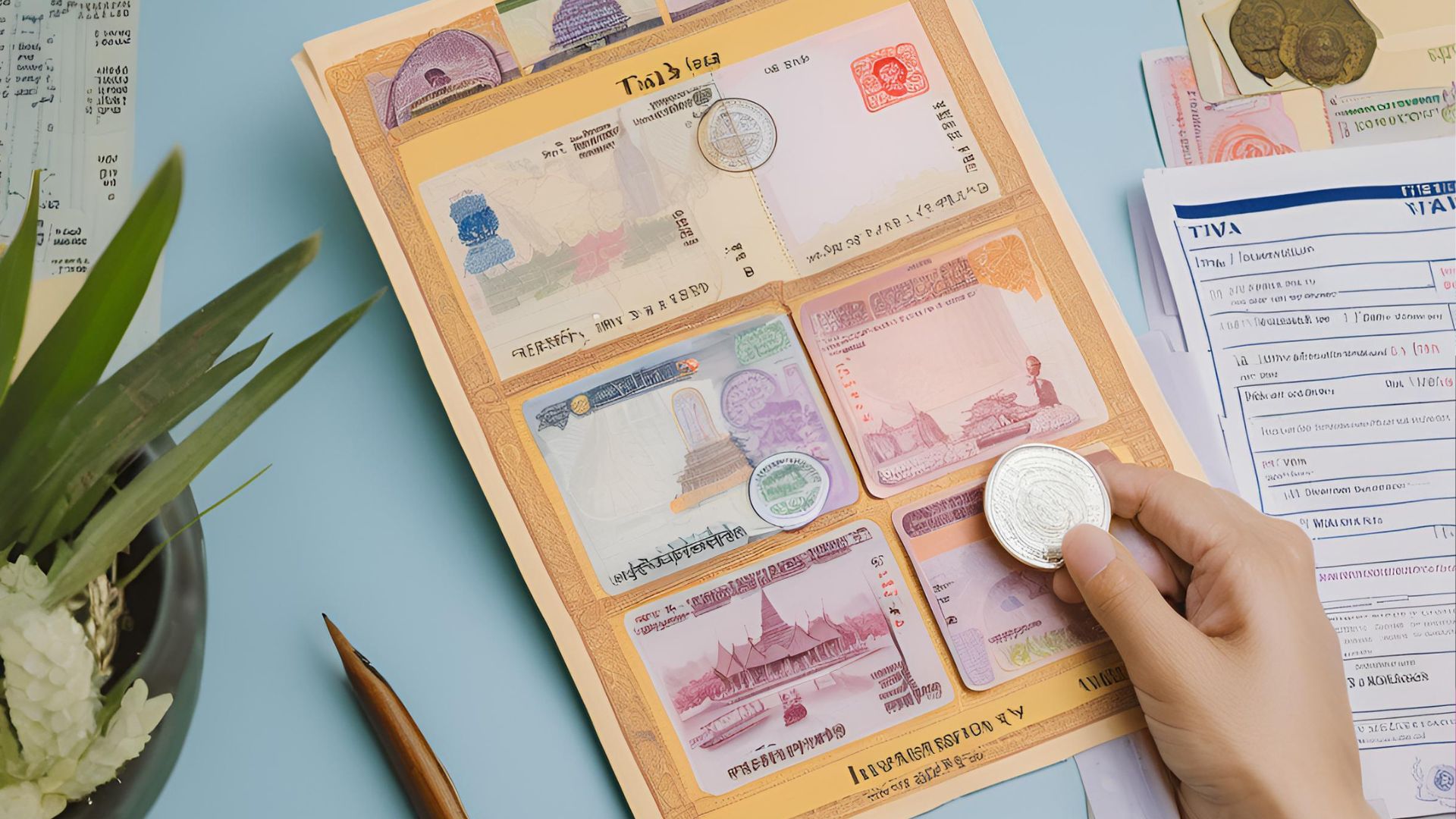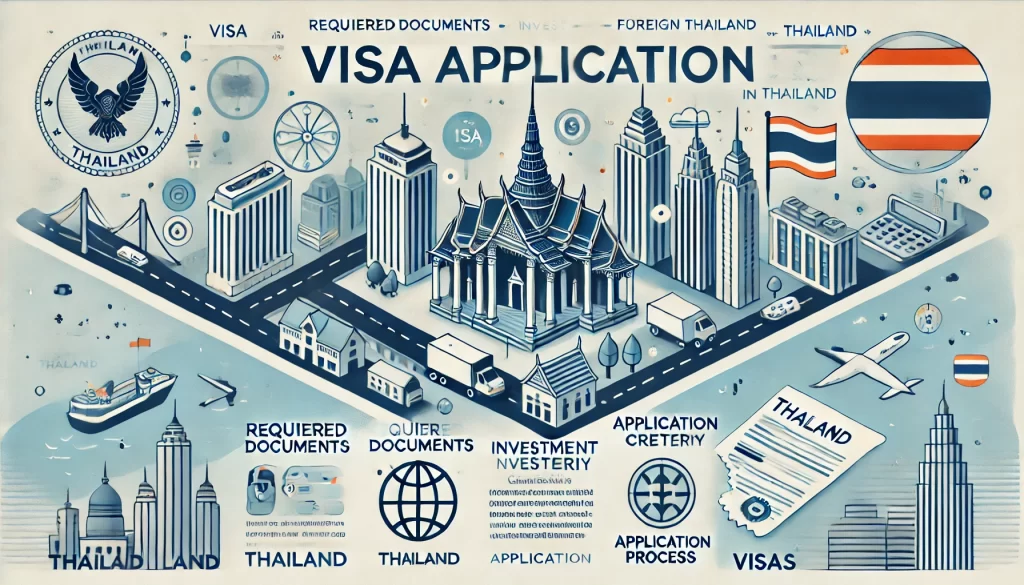Are you dreaming of expanding your business horizons in the Land of Smiles? 🇹🇭 Thailand’s vibrant economy and strategic location make it an attractive destination for foreign investors. But before you can start reaping the benefits of this thriving market, there’s one crucial hurdle to overcome: the visa application process.
For many aspiring investors, navigating Thailand’s visa regulations can feel like traversing a complex maze. The sheer variety of visa types, ever-changing requirements, and intricate application procedures can leave even the most seasoned entrepreneurs feeling overwhelmed. 😰 But fear not! With the right knowledge and preparation, you can transform this daunting task into a manageable step towards your Thai business adventure.
In this comprehensive guide, we’ll walk you through everything you need to know about securing your investor visa in Thailand. From understanding the different visa types available to mastering the application process and maximizing your chances of approval, we’ve got you covered. So, let’s dive in and unlock the secrets to a successful Thai visa application for foreign investors! 🔑🌟
Understanding Thai Visa Types for Investors

Business Visa (Non-Immigrant B)
The Business Visa, also known as Non-Immigrant B visa, is the most common choice for foreign investors in Thailand. This visa is suitable for those who:
- Plan to work or conduct business activities in Thailand
- Intend to establish a company or partnership
- Seek employment with a Thai company
Key features of the Business Visa include:
- Initial validity of 90 days, extendable up to 1 year
- Multiple-entry options available
- Allows for work permit application
| Requirement | Details |
|---|---|
| Proof of funds | Minimum 20,000 THB per person |
| Business documents | Company registration, work offer |
| Passport validity | At least 6 months |
Investment Visa (Non-Immigrant IM)
The Investment Visa (Non-Immigrant IM) is designed for foreign investors making substantial investments in Thailand. This visa type:
- Requires a minimum investment of 10 million THB
- Allows for long-term stay without work permit
- Offers renewable 1-year permits
Thailand Elite Visa
For investors seeking hassle-free long-term stays, the Thailand Elite Visa offers:
- Validity of 5-20 years, depending on the package
- No need for regular visa runs or extensions
- Exclusive privileges and concierge services
Board of Investment (BOI) Visa
The BOI Visa is tailored for investors in BOI-promoted industries. Benefits include:
- Streamlined visa and work permit processes
- Longer validity periods
- Potential for 100% foreign ownership in certain sectors
Now that we’ve covered the main visa types for investors, let’s explore the key requirements for each in more detail.
Key Requirements for Investor Visas

A. Minimum Investment Thresholds
To qualify for an investor visa in Thailand, foreign investors must meet specific minimum investment thresholds. These thresholds vary depending on the type of investment and visa category:
| Visa Type | Minimum Investment |
|---|---|
| Thailand Elite Visa | 500,000 THB – 2,000,000 THB |
| Non-Immigrant B Visa | 2,000,000 THB |
| Board of Investment (BOI) Promotion | Varies by industry |
It’s crucial to note that these amounts are subject to change, so always verify the most current requirements with the Thai Embassy or Consulate.
B. Documentation Checklist
Ensure you have the following documents ready for your investor visa application:
- Valid passport with at least 6 months validity
- Recent passport-sized photographs
- Completed visa application form
- Proof of investment or business ownership
- Bank statements showing sufficient funds
- Criminal background check from your home country
- Health certificate
- Letter of invitation from a Thai company (if applicable)
C. Financial Statements and Proof of Funds
Demonstrating financial stability is crucial for your investor visa application. Prepare the following:
- Bank statements for the past 6 months
- Proof of transfer of investment funds to Thailand
- Audited financial statements of your Thai company (if applicable)
- Personal income tax returns for the past 3 years
D. Business Plan or Investment Strategy
A comprehensive business plan or investment strategy is essential to showcase your intentions in Thailand. Include:
- Detailed description of your business or investment project
- Market analysis and growth projections
- Financial forecasts for at least 3 years
- Potential impact on the Thai economy or job creation
E. Thai Company Registration Details
If you’re investing in or starting a company in Thailand, you’ll need to provide:
- Company registration certificate
- List of shareholders and their nationalities
- Memorandum and Articles of Association
- Tax registration documents
- Work permit applications for foreign employees (if applicable)
Now that we’ve covered the key requirements for investor visas in Thailand, let’s explore the step-by-step process of navigating the application procedure.
Navigating the Application Process

Online vs. In-Person Applications
When applying for an investor visa in Thailand, you have two main options: online or in-person applications. Each method has its advantages and considerations:
| Application Method | Advantages | Considerations |
|---|---|---|
| Online | Convenient, time-saving | May require technical skills |
| In-Person | Direct assistance, immediate clarification | Time-consuming, may require travel |
For online applications, visit the official Thai e-Visa website. The process typically involves:
- Creating an account
- Filling out the application form
- Uploading required documents
- Paying the visa fee online
- Tracking your application status
In-person applications are submitted at Thai embassies or consulates. This method is ideal for those who prefer face-to-face interactions or have complex cases.
Scheduling Appointments with Thai Embassies
To schedule an appointment with a Thai embassy:
- Visit the official embassy website
- Look for the visa appointment section
- Choose a suitable date and time
- Provide necessary personal information
- Receive confirmation email with appointment details
Remember to arrive on time with all required documents to avoid rescheduling.
Preparing for the Visa Interview
A successful visa interview is crucial for your application. Here are some tips:
- Research common interview questions
- Prepare concise, honest answers
- Organize your documents in a logical order
- Dress professionally to make a good impression
- Be confident and maintain eye contact
Common Pitfalls to Avoid
To increase your chances of a successful application, avoid these common mistakes:
- Incomplete or inaccurate application forms
- Missing or expired supporting documents
- Inconsistent information across documents
- Failure to meet financial requirements
- Lack of a clear investment plan
By carefully navigating the application process and avoiding these pitfalls, you’ll be well-prepared for the next steps in obtaining your Thai investor visa.
Maximizing Your Chances of Approval

A. Demonstrating Economic Benefit to Thailand
To maximize your chances of visa approval, it’s crucial to showcase how your investment will contribute to Thailand’s economy. Consider the following key areas:
- Job Creation
- Technology Transfer
- Export Promotion
- Infrastructure Development
| Economic Benefit | Description | Example |
|---|---|---|
| Job Creation | Number of local jobs your business will generate | Creating 50 new positions for Thai nationals |
| Technology Transfer | Introduction of new technologies or skills | Implementing advanced manufacturing techniques |
| Export Promotion | Potential to increase Thailand’s exports | Exporting Thai-made products to new markets |
| Infrastructure Development | Improvements to local infrastructure | Building a new logistics center |
B. Highlighting Your Business Expertise
Demonstrating your business acumen is essential. Prepare a comprehensive portfolio that includes:
- Past business successes
- Relevant qualifications and certifications
- Industry awards or recognition
- Letters of recommendation from business partners or clients
C. Showing Long-Term Commitment
Emphasize your dedication to long-term investment in Thailand by:
- Presenting a detailed 5-10 year business plan
- Outlining plans for reinvestment of profits
- Discussing potential expansion strategies within Thailand
- Demonstrating personal ties to the country (e.g., language learning efforts)
D. Engaging Local Legal Assistance
Partnering with a reputable Thai law firm can significantly improve your application’s chances. They can:
- Ensure all documentation is correctly prepared and translated
- Provide insights into local business regulations
- Represent you in discussions with government officials
- Offer guidance on cultural nuances that may impact your application
By focusing on these key areas, you’ll present a compelling case for your investor visa application. Remember, the goal is to demonstrate not just financial investment, but a genuine commitment to contributing to Thailand’s economic growth and development.
Post-Approval Considerations

Visa Extension Procedures
Once your initial investor visa is approved, it’s crucial to understand the extension process. Typically, you’ll need to apply for an extension 30 days before your current visa expires. Here’s a quick overview:
- Required documents:
- Completed TM.7 form
- Recent passport-sized photos
- Copy of passport
- Proof of investment status
- Financial statements
- Processing time: 3-5 business days
- Extension duration: Usually 1 year
| Extension Type | Duration | Processing Fee (THB) |
|---|---|---|
| Standard | 1 year | 1,900 |
| Premium | 2 years | 3,800 |
Reporting Requirements
As a foreign investor, you must adhere to strict reporting requirements:
- 90-day reporting: Inform immigration of your current address every 90 days
- Annual investment report: Submit details of your investment activities to the Board of Investment (BOI)
Work Permit Applications
If you plan to work in Thailand, you’ll need a separate work permit. The process involves:
- Obtaining a Non-Immigrant B Visa
- Submitting work permit application to the Department of Employment
- Providing proof of qualifications and job offer
Opening Thai Bank Accounts
Opening a Thai bank account is essential for managing your investments. Most major banks offer foreigner-friendly services. Required documents typically include:
- Passport
- Non-immigrant visa
- Proof of address in Thailand
- Reference letter from your home country bank
Tax Implications for Foreign Investors
Understanding your tax obligations is crucial. Key points to consider:
- Personal income tax rates range from 0-35%
- Corporate income tax is generally 20%
- Dividend withholding tax is 10% for non-residents
Consult with a Thai tax professional to ensure compliance and optimize your tax strategy. With these considerations in mind, you’ll be well-prepared to navigate your post-approval journey as a foreign investor in Thailand.
Securing the right visa is a crucial step for foreign investors looking to establish or expand their business presence in Thailand. By understanding the various visa types available, meeting key requirements, and navigating the application process effectively, investors can significantly improve their chances of approval. Remember to thoroughly prepare all necessary documentation, seek professional assistance when needed, and stay informed about any changes in visa regulations.
As you embark on your investment journey in Thailand, maintaining compliance with visa regulations and post-approval considerations is essential for long-term success. By following the tips and strategies outlined in this guide, you’ll be well-equipped to navigate the visa application process with confidence and focus on growing your business in the Land of Smiles.

